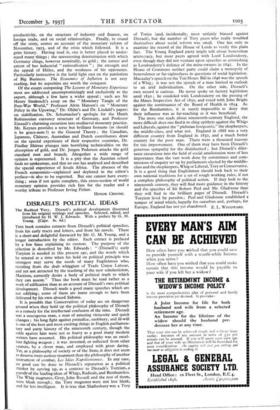DISRAELI'S POLITICAL IDEAS
The Radical Tory. Disraeli's political development illustrated from his original writings and speeches. Selected, edited, and introduced by H. W. J. Edwards. With a preface by G. M. Young. (Cape. 8s. 6d.)
THIS book contains extracts from Disraeli's political speeches, from his early tracts and letters, and from his novels. There is a short and delightful forewOrd by Mr. G. M. Young, and a longer introduction by the editor. Each extract is prefaced by a few lines explaining its context. The purpose of the
selection is described by Mr. Edwards : " (Disraeli's) early Toryism is needed in this present age, and the words which he uttered at a time when his hold on political principle was strongest may serve the needs of many Englishmen who, recoiling from the drab. whiggism of Trade Union Labour, and yet not attracted by the teaching of the new scholasticism, Marxism, earnestly desire a body of political truth to which they can assent." Thus the book must be read rather as a work of edification than as an account of Disraeli's own political development. Disraeli made a good many speeches which are not edifying; some of them are inane enough to have been delivered by his own absurd Sidonia.
It is, possible that Conservatives of today are on dangerous ground when they hold up the political philosophy of Disraeli as a remedy for the intellectual confusion of the time. Disraeli
was a courageous man, a man of amazing virtuosity and quick changes ; his long fight against prejudice, snobbery, and ill-will is one of the best and most exciting things in English parliamen- tary and party history of the nineteenth century, though the
odds against him were not as heavy as a good many modern writers have assumed. His political philosophy was an excel- lent fighting weapon ; it was invented, or collected from other sources, by a clever man, and employed with great daring.
Yet, as a philosophy of society or of the. State, it does not seem to deserve more serious treatment than the philosophy of another instrument of combat, Les Idees Napolioniennes. In any case, no good can be done to Disraeli's reputation as a political thinker by serving up, as a contrast to Disraeli's Toryism, a
Parody of the leading ideas of Whigs, Radicals, and Benthamites. The Whig magnates, Grey, John Russell and the rest of them, were bleak enough; the Tory magnates were not less bleak, and far less intelligent. It is true that Shaftesbury was a Tory of Tories (and, incidentally, most unfairly biassed against Disraeli), but the number of Tory peers who really troubled themselves about social reform was small. One has only to examine the record of the House of Lords to verify this plain fact. The Young England party might talk about benevolent aristocracy, but most peers agreed with Lord Londonderry, even though they did not venture upon speeches as astonishing as Londonderry's defence of the mine-owners in 1842. In the House of Commons neither party could claim a monopoly of benevolence or far-sightedness in questions of social legislation. Macaulay's speech on the Ten Hours Bill in 1846 was the speech of a Whig; it was not the speech of a man limited in outlook to an arid individualism. On the other side, Disraeli's own record is curious. He never spoke on factory legislation until 185o ; he condoled with Londonderry on the passing of the Mines Inspection Act of 185o, and voted with John Bright against the continuance of the Board of Health in 1854. As for the Benthamites, it is surely impossible to deny that their influence was as far-reaching as it was beneficial.
The more one reads about nineteenth-century England, the more difficult does one find it to sling epithets against the Whigs and Liberals, against the "plebeian bourgeoisie," the shopkeepers, the middle-class, and what not. England in 1868 was a very different country from England in 1832, and a much better country for the poor man. There were a thousand reasons for this improvement. One of them may have been Disraeli's generous sympathy for the disinherited ; but Disraeli's dilet- tante excursions into the field of social amelioration were of less importance than the vast work done by committees and com- missions of enquiry set up by parliaments elected by the middle- class and the shopkeepers, Whig or Liberal, Tory or Conservative. It is a good thing that Englishmen should look back to their own national traditions for a set of rough working rules, if not a complete philosophy of political action. If they look to the nineteenth century, they will find more guidance in the history and the speeches of Sir Robert Peel and Mr. Gladstone than they will find in the brilliant pages of Disraeli. Disraeli's Toryism lived by paradox; Peel and Gladstone established a temper of mind which, happily for ourselves and, perhaps, for Europe, England has not yet abandoned. E. L. WOODWARD.


























































 Previous page
Previous page